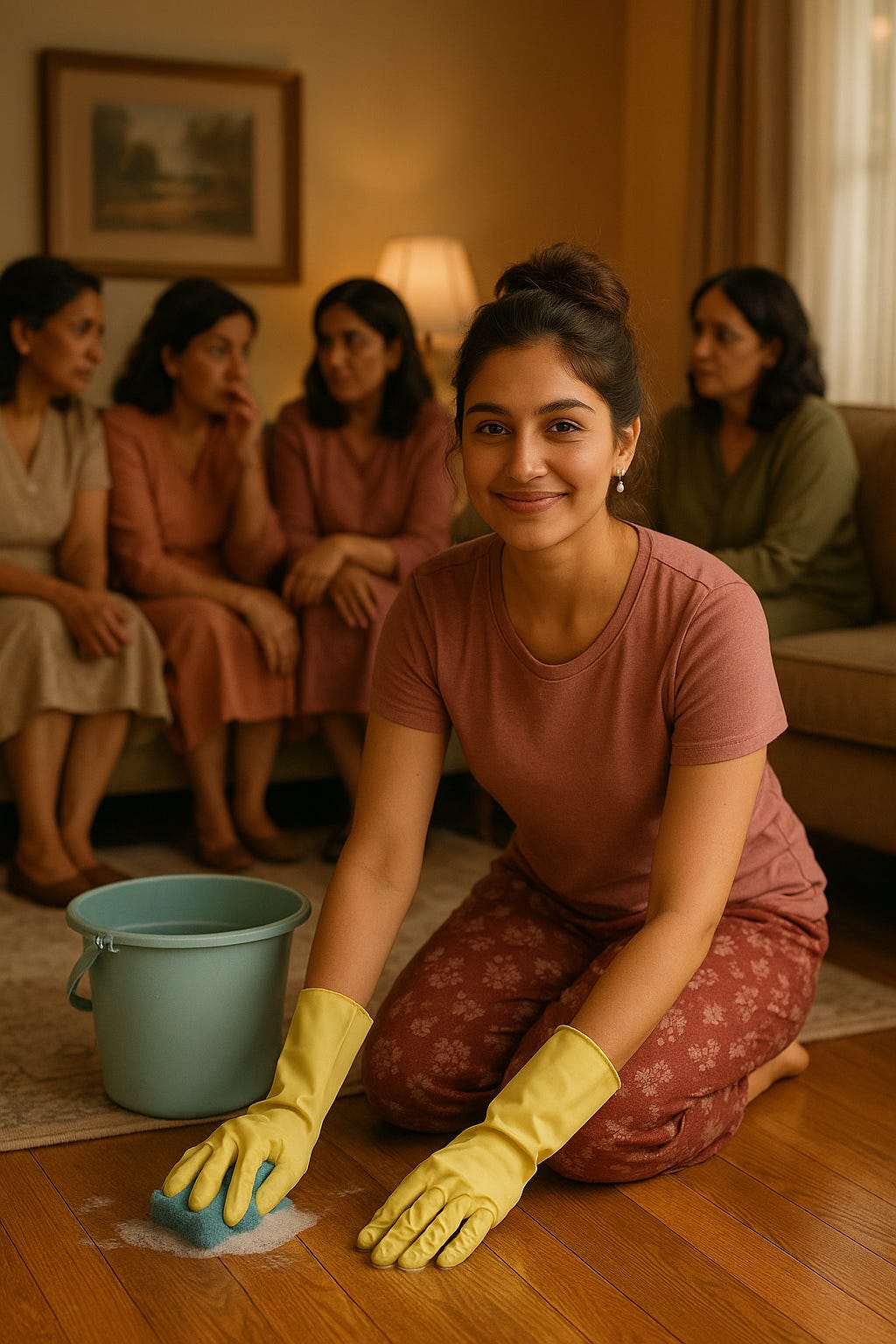The marble floors were the kind that tried too hard—shiny, expensive, emotionally hollow.
Aaratrika Kanchi was crouched in one corner, scrubbing a suspicious stain with industrial precision. She wore lemon-yellow gloves, a simple bun, and the quiet confidence of someone who had once held power and then calmly placed it down.
She wasn’t fast. She was exact. Every plate dried like it was being archived. Every glass arranged like a quiet threat.
In the living room, a kitty party was reaching dangerous levels of chai and suspicion.
Asha, Varsha, Hina, and Hima sat on plush cushions, sipping tea, nibbling on overpriced cookies, and whispering like they were about to uncover a government scandal.
“She used the phrase ‘oxidative damage’ while wiping the stove-top,” Varsha whispered.
“She labeled my medicine drawer,” Hina said. “By interaction risk. I didn’t even ask her to open it.”
“She corrected my dog’s vitamin dosage,” added Hima, looking personally attacked. “Even my vet didn’t notice.”
Asha stared at her empty cup. “She adjusted my posture. Mid-conversation. I haven’t stopped thinking about it.”
They turned to look toward the kitchen, where Aaratrika was now folding napkins into floral geometries—just because.
“She gives off... ex-assassin energy,” Hina said.
“Or a spy on sabbatical,” said Varsha.
“Or someone who’s done real damage,” added Hima softly, “and now folds things to cope.”
The women went silent.
They stared into the middle distance, processing the quiet thunderstorm that was Aaratrika.
Meanwhile, in the kitchen, she loaded the dishwasher with surgical grace and absolute indifference.
Aaratrika knew they were talking. She let them.
Because mystery?
Is cleaner than truth.
Then Aaratrika walked in.
She placed a tray of fresh napkins on the table, perfectly centered, adjusted by a single millimetre. Her gloves were off now. Her hands: clean. Her face: unreadable.
There was a pause. A hum in the room that felt more like an exam hall than a social gathering.
Then Varsha, the boldest among the emotionally unstable, asked, “So… what have you studied?”
Aaratrika looked up. Calm. Direct.
“I’m a doctor,” she said.
Three words. No emotion. No apology.
Asha’s spoon slipped. Hina blinked twice. Varsha’s brain made a buffering sound. Hima dropped her cookie.
And Aaratrika—quiet, surgical, bored—walked back to the kitchen.
---
That night, the group chat died.
No gifs. No “Good night 🌙.” Just the eerie digital silence of four women grappling with their place in the universe.
Hima, the most emotionally stable of the group (relatively), tried to process it in a healthier way.
She lit a candle. Opened her journal. Wrote:
“Today I met a woman who gave up respectability to clean other people’s messes.
And somehow, she looked… free.”
---
Back in her tiny apartment, Aaratrika watered her plant, made chamomile tea, and sat down to read a book on microbial resistance. For fun.
No spirals. No group chats. No explanation.
Just silence. And a lavender-scented awareness that four women, somewhere in the city, were lying awake tonight—questioning their life choices because of one quiet cleaning lady who turned out to be more qualified than their entire family tree.
She smiled.
Then went to bed.




